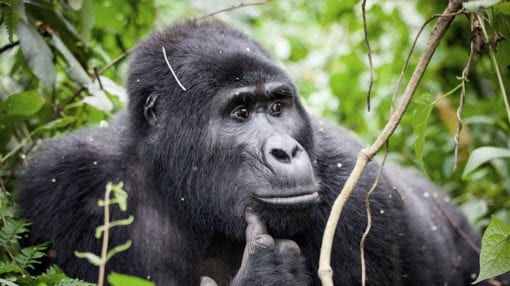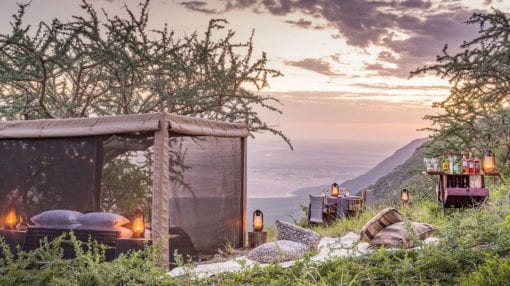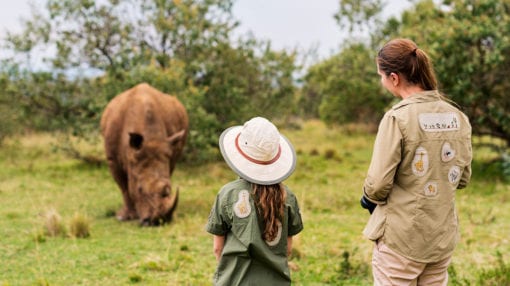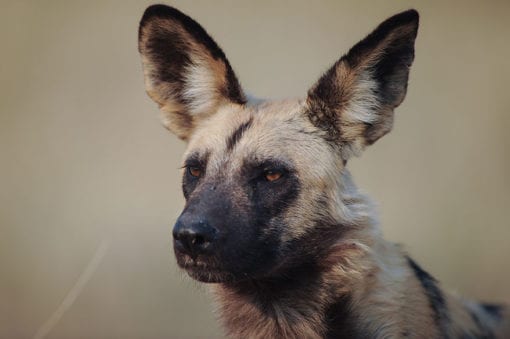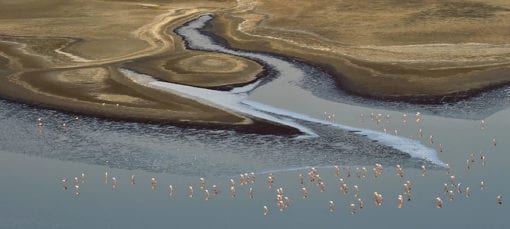A story from my recent trip to Africa
Spanning the border of Kenya and Tanzania is Lake Natron, famous for its flocks of colorful flamingos. I had the chance to visit this beautiful lake in early December with my friend Rob who works as a safari guide and owner of Nale Moru Experiential Travel Co. and the experience was one of the most memorable of the 4 ½ months I’ve been in Africa this fall. We drove out to the lakeshore in the late afternoon and paused en route on a hill to take in the view, and saw a small shelter and some figures dressed in red sitting on the ground. As we drew closer, the figures resolved into a smiling group of young Maasai girls, who crowded around to greet us and encourage us to stop by again on our way back from seeing the flamingos. Their approach was a funny, charming mixture of eagerness and restraint, competition and cooperation; they clearly wanted us to buy some crafts & jewellery, but realized (or had been taught) that visitors wanted a chance to see the flamingos first. And while each girl excitedly introduced herself (over and over) and asked us to pick something from her collection, they also urged us to pick “one, one, one” (pointing around the group and implying one item from each of them).
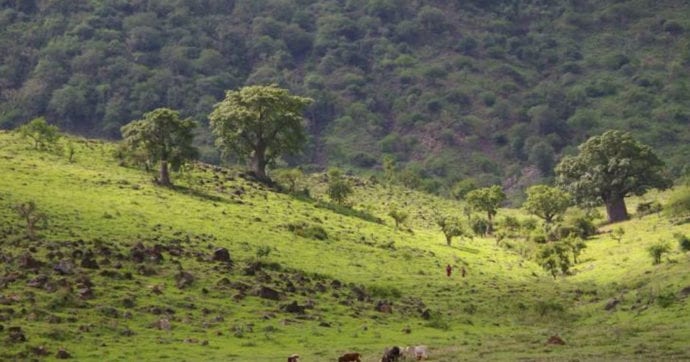
By the time we were done watching small groups of flamingos wheel and swirl and settle down amidst thousands more, and choosing “one, one, one”, it was nearly dark. I wondered if their parents were coming to get them, or if a minibus would ply the route they needed to get home, or if maybe their village was close, invisible behind the nearby hills, and they were going to walk. Rob suggested that we give them a lift, which sounded like a good idea, so somehow we packed 9 little girls into the land cruiser (which had seats for 6, and 4 adults already on board!), and set off. After a few minutes they started singing with strong, sweet voices. By the time we got to a village 20 minutes’ drive away I realized they had walked a very long way. Yet we didn’t stop there. We continued on into the night, through a stretch of street with people selling things by kerosene lantern. The girls suddenly stopped singing for a bit; I wasn’t sure why but they didn’t seem tired so it was probably something else. A little further, we crossed a puddle so wide and deep I asked in my very amateurish Swahili “Barabara, kweli?” (“the road, really?”), and finally we arrived at a corrugated metal gate—their entry to their neighborhood. Thank-you’s and goodnights. On the way back, the guys explained that the girls were afraid to walk in the dark because of wild animals, but also because unruly unemployed older boys would attack them and steal their money. They’d gone silent so that the boys wouldn’t realize they were traveling in the vehicle. It was sad thing to realize, especially when I’d just been reflecting, impressed, on all the trust that had been shown that day: their trust that we would return to them after the flamingos and support their craft stand enterprise, our trust that they wouldn’t try to steal anything from the unlocked vehicle while our attention was on the birds, their parents’ trust that we, sight unseen, would help them get home safely. On the other hand, this wasn’t a scripted and polished cultural tourism experience, it was an encounter with reality, the good and the bad.
The next day we returned to the lake at sunrise to take more photos. I wanted to give the girls the big chocolate bar I’d brought on the trip, so I sleepily grabbed it from the baboon-proof kitchen box at camp, wondering how long it would stay solid under the sun shelter where I planned to leave it for them to discover, before succumbing to the melting heat of day. We saw the sun’s first rays to light the unforgettable landscape of the Rift Valley, Ol Donyo Lengai (“the mountain of God”), and Lake Natron itself. We photographed the flamingos as the intensifying sun turned their feathers from a pale silvery color to bold pink, and we laughed at how the mud changed consistency unpredictably and threatened to trip us. Then a slight movement in the distance caught my eye, and I swung my binoculars up to find out what it was: a line of red-clad girls, heading back to the shore for another day at their craft stand. For a moment I couldn’t believe it. They must have started their long walk before dawn to arrive when they did. It made sense, though, to plan the journey for the coolest part of the day. In a way it seemed harsh, that such young kids had to walk for over 2 hours to get to work, and that they had to work at all. On the other hand, they had each other, they were attuned to the natural rhythm of the day, and they were strong. I didn’t pity them; if anything I was vaguely pitying the obese kids back in America who sat in carpeted, air-conditioned living rooms and played too many video games.
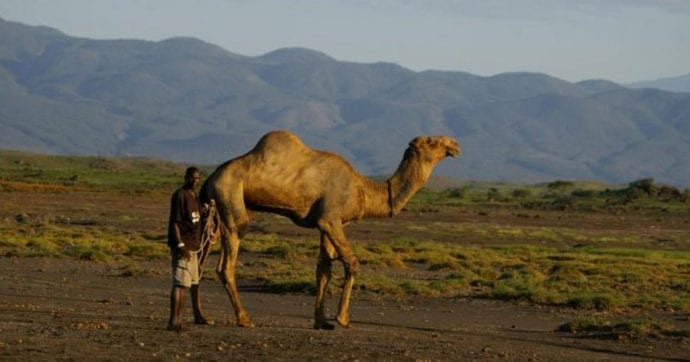
When the girls arrived, we said hi. It was unexpected to be able to interact with them a second time, on a more social level. We weren’t friends, of course, in terms of any long-established relationship, and I may never see them again, but something had shifted. Some of them pulled out their jewelry & crafts to show again, but it was a side activity, not the driving force.
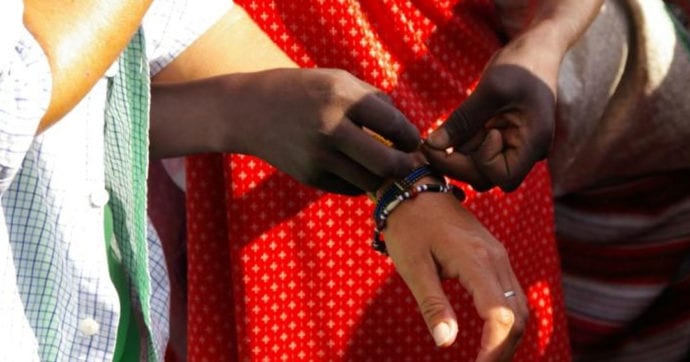
We were the people from yesterday night, not fresh, anonymous tourists. I was able to give them the chocolate bar in person, with the friendly admonition to enjoy it and remember to SHARE. Realizing we were leaving soon and didn’t really need it, we gave them our big bag of granola too. Rob found the bag of pens his European friends had given him to distribute to poor students he comes across on safari and passed them out to all. And then, I look down to see the cause of a light tickle on my arm: small hands are fastening on another bracelet, and dark eyes are shining up at me. Hmmm, if it were somewhere else I’d be suspicious of a hard-sell and high pressure to buy it.
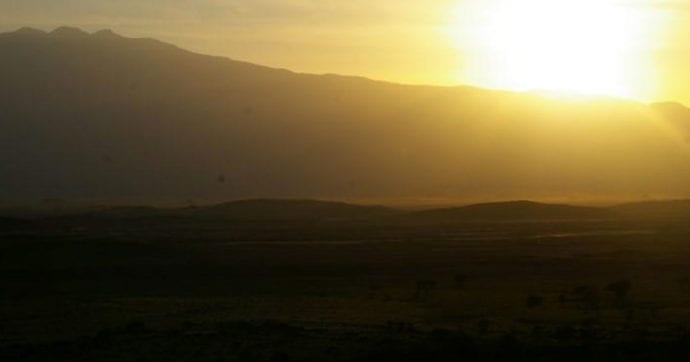
As it was, I was a little uneasy and looked over at Rob with raised eyebrows and tried to tactfully figure out what was going on. It was a gift! Hugely humbled, relieved of the need to be suspicious or defensive as a travel survival strategy, laughing at myself for just moments ago reminding *them* to share, I savored the moment. The gift of the Maji, centuries later under an African sky.
